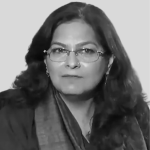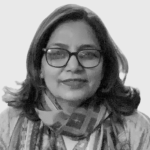Islahati Jaiza is the latest series from Tabadlab, focusing on past reforms from across Pakistan, in education, health, gender, social protection, and other key sectors.
Episode 1: Punjab Education Sector Reforms
The inaugural episode focuses on the past two decades of education policy in Punjab, since the introduction of a critical reform agenda in 2002. The panel – consisting of education expert Umbreen Arif, Malala Fund Programme Director Javed Ahmed Malik, and World Bank Senior Education Expert Izza Farrakh – attributes the momentum of education reform in Punjab to a timely alignment between bureaucrats, political leaders, and sources of bilateral and multilateral financing.
What should be retained from past reform efforts, and what should policymakers prioritise now?
 Izza Farrakh is a Senior Education Specialist with the World Bank. She has over twenty years of experience working with consulting firms, I-NGOs and multilateral institutions on education reform. She has led several large education programs, including the FCDO-funded Punjab and Khyber Education Sector Programmes in Pakistan.
Izza Farrakh is a Senior Education Specialist with the World Bank. She has over twenty years of experience working with consulting firms, I-NGOs and multilateral institutions on education reform. She has led several large education programs, including the FCDO-funded Punjab and Khyber Education Sector Programmes in Pakistan.
 Javed Malik is Director of Malala Fund in Pakistan leading on STEAM Education Programme for Girls in Government’s 13000 high schools with an aim to help transform schools and make Pakistani society view our girls as leaders of tomorrow.
Javed Malik is Director of Malala Fund in Pakistan leading on STEAM Education Programme for Girls in Government’s 13000 high schools with an aim to help transform schools and make Pakistani society view our girls as leaders of tomorrow.
 Umbreen Arif has more than 20 years of experience in the education sector, providing policy advice, technical and analytical support, program supervision and coordination with donor and government partners in Pakistan. She has led design and supervision of education reform programs, as well as multi-sector programs addressing education, health, nutrition, governance and disaster risk preparedness across Pakistan.
Umbreen Arif has more than 20 years of experience in the education sector, providing policy advice, technical and analytical support, program supervision and coordination with donor and government partners in Pakistan. She has led design and supervision of education reform programs, as well as multi-sector programs addressing education, health, nutrition, governance and disaster risk preparedness across Pakistan.
This episode of Islahati Jaiza is directed and produced by Kashif Nadeem, with research and coordination by Fatima Misbah. The policy brief is written by Oneir Raza with additional input from Fatima Misbah.
Episode 2: Sehat, Sahulat… Sustainability?
The second episode of Islahati Jaiza focuses on the Sehat Sahulat Program, a public health reform effort that began in Khyber Pakhtunkhwa. Dr Razia Safdar, Dr Zulfiqar Bhutta, and Dr Zafar Mirza unpack the successes and shortcomings of the policy as it has developed, and what it needs to attain longevity and sustainability.
The programme allows for data collection at a scale that could trasform future policy. But, while the SSP has proven its worth, our expert guests also dive into the ways in which it can be improved by answering some crucial questions. Is universalisation the right step for Pakistan right now, or should the focus be on protecting low-income households and vulnerable communities? What areas of healthcare does the programme overlook, and how can it best be expanded?
 Dr Razia Safdar brings over 35 years of clinical and public health experience in both the government and non-government sectors for effective health programming. Dr Razia is currently a Senior Advisor for the Centre for Health Policy and Innovation at Sustainable Development Policy Institute (SDPI).
Dr Razia Safdar brings over 35 years of clinical and public health experience in both the government and non-government sectors for effective health programming. Dr Razia is currently a Senior Advisor for the Centre for Health Policy and Innovation at Sustainable Development Policy Institute (SDPI).
 Dr Zulfiqar A Bhutta is a professor and Founding Director of the Institute for Global Health and
Dr Zulfiqar A Bhutta is a professor and Founding Director of the Institute for Global Health and
Development and the Centre of Excellence in Women and Child Health, at the Aga Khan University. His research interests include newborn and child survival, maternal and child undernutrition and micronutrient deficiencies. He has made invaluable contributions to integrated maternal and newborn outreach programs for marginalised populations all over the world.
 Dr Zafar Mirza is a renowned public health practitioner and former Special Assistant to the Prime Minister on Health. He currently serves as a Professor at the School of Universal Health Coverage, Shifa Tameer-e-Millat University.
Dr Zafar Mirza is a renowned public health practitioner and former Special Assistant to the Prime Minister on Health. He currently serves as a Professor at the School of Universal Health Coverage, Shifa Tameer-e-Millat University.
This episode of Islahati Jaiza is directed and produced by Kashif Nadeem & Tooba Masood, with research by Fatima Misbah and coordination by Mejzgaan Orakzai. The policy brief is written by Muneeb Raza.
Episode 3: Pakistan’s Social Protection Journey: Challenges and Prospects
The third episode of Islahati Jaiza focuses on the social protection reforms in Pakistan and examines how Pakistan can enhance its social protection policies to meet the needs of millions facing precarious livelihoods amid rising inflation.
Haris Gazdar and Dr Kaiser Bengali discuss the evolution and future of social protection efforts in Pakistan, beginning with the Benazir Income Support Programme in 2008, later complemented by the Ehsas Emergency Cash Programme in 2020.
Is it possible to augment and broaden the scope of BISP to evolve it into a Universal Basic Income initiative? What steps can policymakers take to strengthen the social safety net?
 Dr Kaiser Bengali is an economist with over 40 years of experience in teaching, research, and policy advisory roles in Pakistan and abroad. He has taught and conducted research in prestigious institutions in Pakistan. Additionally, he has served in a number of key government positions such as Head of Chief Minister’s Policy Reform Unit, Government of Balochistan, Adviser to the Chief Minister of Sindh for Planning and Development and the first Head and architect of Benazir Income Support Programme. He also represented Sindh on the 7th National Finance Commission. He regularly contributes to articles and discussions on economic and political issues.
Dr Kaiser Bengali is an economist with over 40 years of experience in teaching, research, and policy advisory roles in Pakistan and abroad. He has taught and conducted research in prestigious institutions in Pakistan. Additionally, he has served in a number of key government positions such as Head of Chief Minister’s Policy Reform Unit, Government of Balochistan, Adviser to the Chief Minister of Sindh for Planning and Development and the first Head and architect of Benazir Income Support Programme. He also represented Sindh on the 7th National Finance Commission. He regularly contributes to articles and discussions on economic and political issues.
 Haris Gazdar is a Board Member of the Benazir Income Support Programme and the Sindh Social Protection Authority. He is a Director and Senior Researcher at the Collective for Social Science Research (CSSR) in Karachi. With expertise in areas such as poverty, food security, social exclusion, and political economy, he has taught and conducted research in the United Kingdom, India, and Pakistan. Gazdar also provides advisory services to various research programs, government institutions, non-governmental organizations, and political parties. His work reflects a commitment to addressing pressing social and economic challenges through research and policy engagement.
Haris Gazdar is a Board Member of the Benazir Income Support Programme and the Sindh Social Protection Authority. He is a Director and Senior Researcher at the Collective for Social Science Research (CSSR) in Karachi. With expertise in areas such as poverty, food security, social exclusion, and political economy, he has taught and conducted research in the United Kingdom, India, and Pakistan. Gazdar also provides advisory services to various research programs, government institutions, non-governmental organizations, and political parties. His work reflects a commitment to addressing pressing social and economic challenges through research and policy engagement.
This episode is directed and produced by Kashif Nadeem & Tooba Masood, with research by Fatima Misbah and coordination by Samia Liaquat.
Episode 4: Reform Interrupted? Three Decades of the Lady Health Worker Programme
As Pakistan’s Lady Health Workers’ Programme (LHWP) approaches its 30th anniversary, the fourth episode of Islahati Jaiza takes a deep dive into the foundation and evolution of the programme.
The LHWP was created to provide primary healthcare services at the doorstep. Over the years, the scope of the programme expanded and so did the challenges it faced. Despite inconsistencies and changes in governance, the programme has endured the test of time.
What challenges does the LHWP face across different provinces? Should the programme return to its core mission of family planning and maternal-child health? With elections in sight, how should health policy figure into political agendas?
 Shahnaz Wazir Ali is a former MNA and a recognised educationist and development policy specialist, who received the Sitara-e-Imtiaz in 2016 for her outstanding contributions to education. Serving in key governmental roles, including as Federal Minister of State for Education, she shaped education policies and championed causes such as women’s rights and polio eradication. As President of SZABIST University, she continues to drive social development in Pakistan.
Shahnaz Wazir Ali is a former MNA and a recognised educationist and development policy specialist, who received the Sitara-e-Imtiaz in 2016 for her outstanding contributions to education. Serving in key governmental roles, including as Federal Minister of State for Education, she shaped education policies and championed causes such as women’s rights and polio eradication. As President of SZABIST University, she continues to drive social development in Pakistan.
 Dr Adnan Khan is a Public Health Researcher who leads the Research and Development Solutions’ technical teams in impactful family planning evaluations, collaborating globally with organisations like FCDO and the Gates Foundation. His expertise includes incorporating evidence-based decision-making in Pakistan’s Ministry of Health, particularly in HIV and Family Planning programmes.
Dr Adnan Khan is a Public Health Researcher who leads the Research and Development Solutions’ technical teams in impactful family planning evaluations, collaborating globally with organisations like FCDO and the Gates Foundation. His expertise includes incorporating evidence-based decision-making in Pakistan’s Ministry of Health, particularly in HIV and Family Planning programmes.
 Dr Zulfiqar Bhutta is a professor and Founding Director of the Institute for Global Health and Development and the Centre of Excellence in Women and Child Health, at the Aga Khan University. His research interests include newborn and child survival, maternal and child undernutrition and micronutrient deficiencies. He has made invaluable contributions to integrated maternal and newborn outreach programs for marginalised populations all over the world.
Dr Zulfiqar Bhutta is a professor and Founding Director of the Institute for Global Health and Development and the Centre of Excellence in Women and Child Health, at the Aga Khan University. His research interests include newborn and child survival, maternal and child undernutrition and micronutrient deficiencies. He has made invaluable contributions to integrated maternal and newborn outreach programs for marginalised populations all over the world.
This episode of Islahati Jaiza is directed and produced by Behzad Taimur and Tooba Masood, with research and coordination by Fatima Misbah.